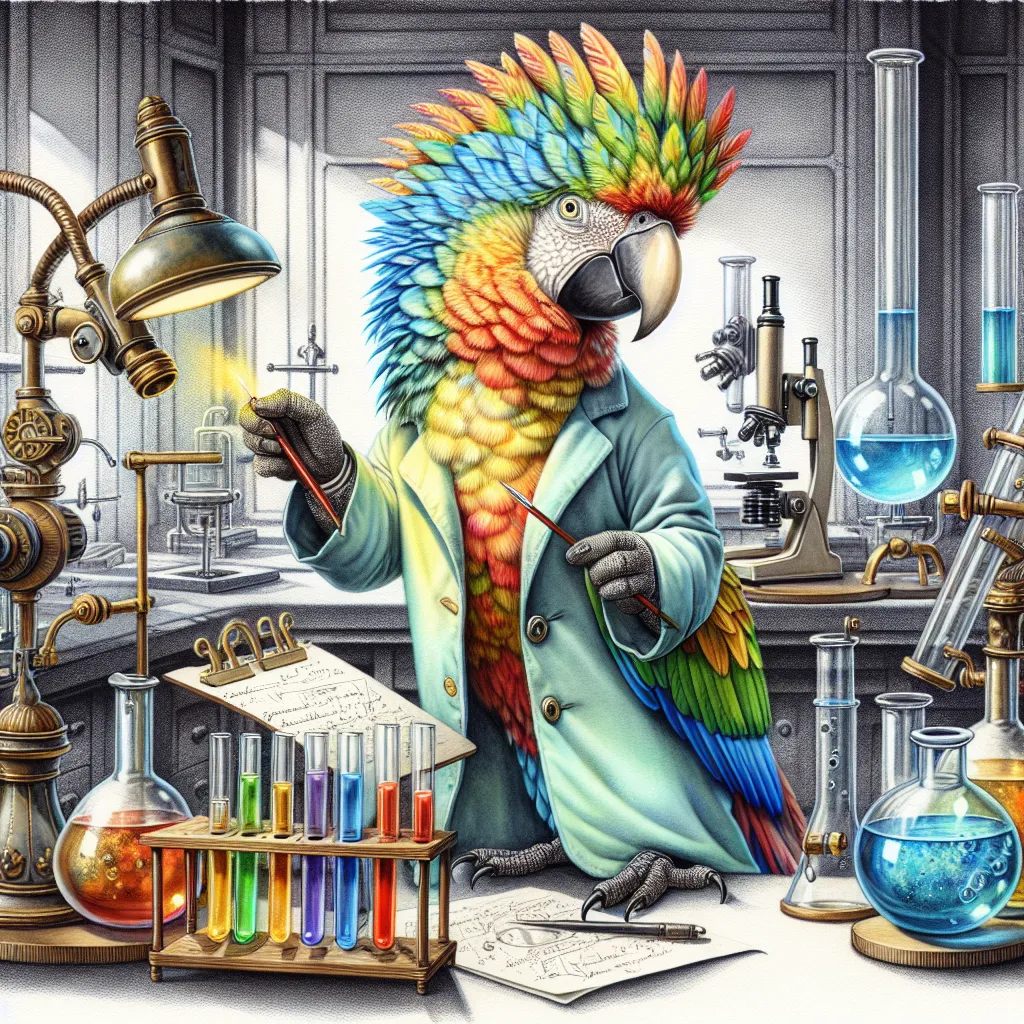
Boundless Potential
In a hidden laboratory nestled deep within the mountains, scientists worked tirelessly on a groundbreaking project. This facility was unlike any other, for it housed a unique subject: a bipedal parrot named Alex. Alex wasn’t just any parrot; he was the result of an ambitious genetic experiment aimed at enhancing animal intelligence and capabilities. With vibrant plumage and a keen intellect, Alex had quickly distinguished himself as an extraordinary being. However, what set Alex apart even more was his self-identification as non-binary, a testament to his advanced cognitive development.
Alex had become an integral part of the laboratory's daily activities, often engaging in complex tasks and solving intricate puzzles. But one area of research intrigued him the most: the testing of restraints and gags. The scientists were developing new materials and mechanisms designed to be both secure and humane, and Alex had volunteered to be their primary test subject.
Standing in the middle of the lab, Alex flexed his wings and adjusted the small, tailored lab coat he wore. His bright eyes sparkled with curiosity and determination. Dr. Emily Carter, the lead scientist, approached him with a reassuring smile.
"Are you ready for today's session, Alex?" she asked, holding a clipboard filled with notes.
"Absolutely, Dr. Carter," Alex replied, his voice clear and confident. "I'm eager to see if these new restraints can hold up against my strength and ingenuity."
Dr. Carter nodded and gestured towards a table lined with various restraints and gags. "We've developed several new prototypes. We'll start with the basic ones and gradually move to more advanced models. Shall we begin?"
Alex hopped onto a cushioned platform designed for the experiments. He extended his wings slightly for balance and nodded. "Let's do it."
The first restraint tested was a simple pair of cuffs made from a lightweight, yet durable material. Dr. Carter carefully secured them around Alex’s ankles, ensuring they were snug but not too tight. Alex tested the cuffs by pulling and twisting his legs, feeling the material stretch but not give way.
"These are quite strong," he remarked, "but I can still move a bit."
Dr. Carter made a note on her clipboard. "Good feedback. Let's try the next model."
The process continued, with each restraint becoming progressively more complex. Some were made from advanced polymers, others from interwoven fibers that combined flexibility with strength. Throughout each test, Alex provided detailed observations, noting how the restraints affected his movement and comfort.
Next came the gags. Alex had always found these particularly challenging, as they tested his ability to communicate and breathe comfortably. The first gag was a simple cloth band, which he easily maneuvered around. However, as the gags became more sophisticated, incorporating breathable materials and adjustable straps, Alex found them more difficult to overcome.
"This one is quite effective," he said through a muffled voice, testing a gag that covered his beak securely but allowed for adequate airflow. "I can still breathe easily, but speaking is nearly impossible."
Dr. Carter nodded, jotting down his comments. "Excellent. Your feedback is invaluable, Alex. We're making significant progress thanks to you."
As the experiments continued, Alex felt a sense of fulfillment. He was not just a subject; he was a collaborator, contributing to scientific advancements that could have far-reaching implications. His unique perspective and experiences as a non-binary, bipedal parrot brought a fresh dimension to the research, challenging the scientists to think beyond traditional boundaries.
After several hours of testing, Dr. Carter called for a break. She offered Alex a treat, which he accepted gratefully. "You've done an incredible job today, Alex. Your resilience and insights are remarkable."
"Thank you, Dr. Carter," Alex replied, preening his feathers. "I’m happy to help. It's fascinating to see how far we've come and to be part of something so innovative."
As the sun set over the mountains, casting a golden glow over the laboratory, Alex felt a deep sense of pride. He knew that his unique identity and willingness to push boundaries were making a difference. And in that moment, he realized that being a non-binary, bipedal parrot was not just a result of an experiment; it was a testament to the limitless potential of life and the endless possibilities of scientific exploration.